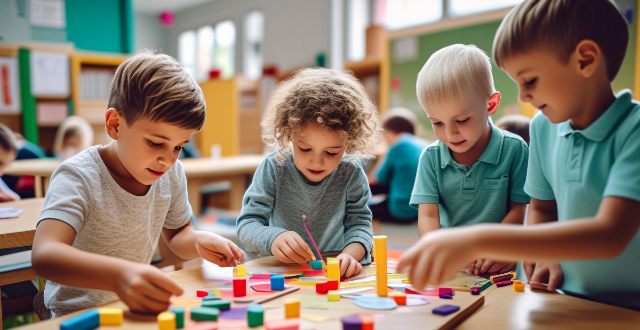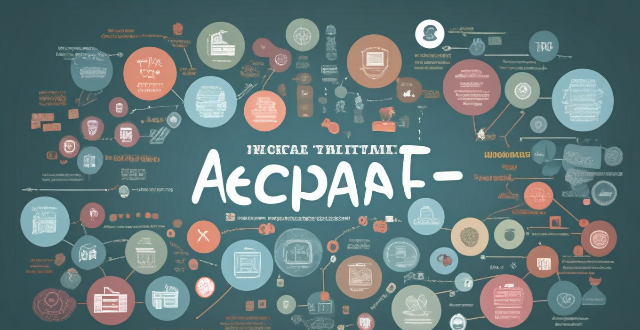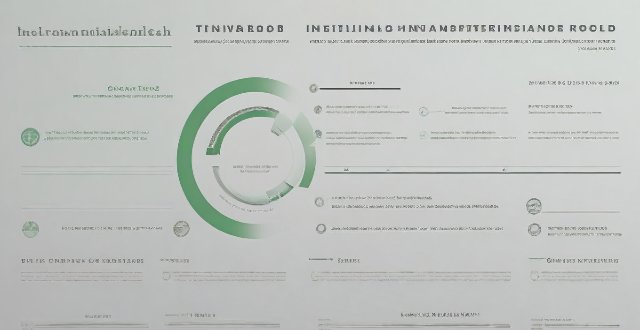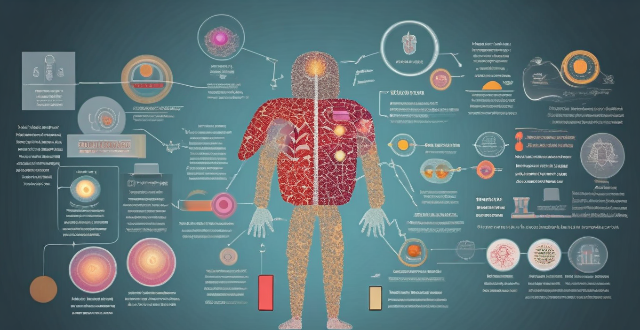Emotional Preschool

How important is socialization in preschool ?
Socialization in preschool is crucial for children's development, helping them develop social skills, emotional intelligence, cognitive abilities, language proficiency, and confidence. It involves learning to interact with others, form relationships, and understand emotions. Benefits include sharing, cooperation, empathy, communication, emotional awareness, regulation, perspective taking, problem-solving, conversation skills, vocabulary expansion, self-discovery, and positive feedback. Prioritizing socialization in preschool programs sets children up for success in school and beyond.

What are the benefits of preschool education ?
Preschool education is crucial for children's future academic success and overall development, offering benefits in social development, cognitive growth, early literacy and math skills, fine and gross motor skills, self-help abilities, school readiness, and parental involvement. It helps children develop interpersonal skills, emotional intelligence, language skills, problem-solving abilities, reading readiness, math concepts, hand-eye coordination, physical fitness, independence, life skills, routine adaptation, classroom etiquette, family partnerships, and parent education. Preschool prepares children for elementary school by nurturing their social, emotional, cognitive, physical, and self-help skills in a stimulating and supportive environment.

At what age should children start attending preschool ?
The appropriate age to start preschool varies depending on the individual child and their readiness for the experience. Most experts agree that three to four years old is an ideal age range for starting preschool. However, it's essential to consider each child's unique circumstances and needs before making a decision. Early education plays a crucial role in shaping a child's cognitive, social, and emotional development. By enrolling children in preschool, parents can help them develop essential skills such as socialization, language development, cognitive growth, and emotional intelligence. Before deciding when to start your child in preschool, consider factors such as the child's maturity level, developmental milestones, family situation, financial considerations, and quality of program.

How does preschool education prepare children for kindergarten and beyond ?
Preschool education is crucial in preparing children for kindergarten and beyond. It helps them develop essential skills such as socialization, language development, cognitive development, emotional development, fine motor skills, and gross motor skills. These skills are crucial for success in kindergarten and beyond, where children will be expected to work and play with others, read, write, and communicate effectively, navigate complex social situations, form healthy relationships, and participate in physical activities. By attending preschool, children gain a strong foundation for future learning and success in all areas of life.

What are the different types of preschool programs available ?
Preschool programs are designed to prepare young children for kindergarten and beyond. There are several types of preschool programs available, each with its own unique approach and focus. The most common types of preschool programs include Montessori, Waldorf, Reggio Emilia, High Scope, Play-Based, Head Start, and Co-op/Parent Participation. Each program has its own key features and benefits. When choosing a preschool program for your child, it's essential to consider your family's needs, values, and preferences to find the best fit for your little one's early education journey.

What role do teachers play in preschool education ?
Teachers in preschool education play a pivotal role in laying the foundation for children's lifelong learning and development. They are responsible for guiding learners, building foundational skills, encouraging creativity and imagination, promoting physical health and wellness, supporting emotional development, facilitating socialization, and partnering with families. Teachers provide emotional support, foster curiosity, focus on social and communication skills, introduce cognitive concepts, engage children in creative activities, ensure physical activity and healthy habits, contribute to emotional well-being, help children learn how to be part of a community, and work closely with families. Their impact extends beyond the classroom into the formation of well-rounded individuals ready to face future challenges.

Can preschool education help close the achievement gap ?
Preschool education can help close the achievement gap by providing access to high-quality programs, supporting language development, promoting social and emotional growth, and addressing disparities in early childhood experiences.

What are the key elements of a quality preschool program ?
**Key Elements of a Quality Preschool Program** A high-quality preschool program focuses on the overall development of children, incorporating various elements that support their growth. These include: 1. **Curriculum Design**: - Developmentally appropriate practices. - Integrated learning across domains. - Play-based learning activities. 2. **Qualified Educators**: - Certified teachers with early childhood education credentials. - Continuous professional development opportunities. 3. **Safe and Supportive Environment**: - Physical safety measures. - Emotional support from educators. 4. **Parent Involvement and Partnership**: - Open communication channels. - Opportunities for parental participation. 5. **Health and Nutrition**: - Health policies and hygiene practices. - Nutritious meals and snacks. 6. **Assessment and Evaluation**: - Ongoing observations by teachers. - Developmental screenings for children. 7. **Diversity and Inclusion**: - Culturally responsive teaching methods. - An inclusive environment for all children. 8. **Class Size and Adult-to-Child Ratio**: - Small class sizes. - Adequate supervision ratios. 9. **Curriculum Flexibility**: - Adaptable curriculum to meet changing needs. - Integration of family and community resources. 10. **Active Learning**: - Hands-on experiences. - Outdoor play opportunities. By addressing these key elements, preschool programs can provide a comprehensive and enriching experience for young children, fostering their social, emotional, cognitive, and physical development.

How can parents support their child's learning in preschool ?
Parents can support their child's preschool learning by reading with them, encouraging curiosity and exploration, fostering socialization skills, and establishing routines and structure. Reading enhances language development and cognitive abilities, while also fostering emotional bonding. Encouraging curiosity through activities like nature walks and science experiments helps in cognitive and emotional development. Fostering socialization skills is crucial for your child's interaction with peers and adults. Establishing routines and structure promotes self-discipline, reduces anxiety, and enhances learning.

How do I choose the right preschool for my child ?
Choosing a preschool involves considering factors like philosophy, teacher qualifications, curriculum, and communication. It's important to visit potential schools and talk to other parents before deciding which one is best for your child.

How much exercise is needed to see emotional benefits ?
Engaging in regular physical activity is not only beneficial for your physical health but also for your emotional well-being. The question of how much exercise is needed to see emotional benefits is a common one, and the answer may vary depending on individual factors such as age, fitness level, and personal goals. However, there are some general guidelines that can help you determine the amount of exercise needed to experience emotional benefits. There are various types of exercise that you can incorporate into your routine, including aerobic exercise, strength training, flexibility exercises, and balance exercises. Regular exercise has been shown to have numerous emotional benefits, including reduced stress and anxiety, improved mood, better sleep, and increased self-esteem. According to the American Heart Association, the following guidelines are recommended for adults to achieve significant health benefits: - At least 150 minutes per week of moderate-intensity aerobic activity or 75 minutes per week of vigorous-intensity aerobic activity. - At least two days per week of strength training exercises involving all major muscle groups. - At least two to three days per week of flexibility exercises to maintain range of motion and prevent injury. - As needed, particularly for older adults or those with balance issues. It's important to note that individual needs may vary, and it's essential to listen to your body and adjust your exercise routine accordingly to ensure you're getting the most out of your workouts.

How does exercise influence mood and emotional stability ?
Exercise has a positive impact on mood and emotional stability by releasing endorphins, reducing stress hormones, enhancing resilience, promoting mindfulness, and providing a sense of achievement. Incorporating regular exercise into your lifestyle can lead to better mental health and overall well-being.

Are there specific workout routines designed for emotional stability ?
Emotional stability is an important aspect of overall well-being, and exercise can play a significant role in achieving it. Cardiovascular exercises like running, cycling, swimming, and dancing increase heart rate and blood flow, reducing stress and anxiety levels while releasing endorphins that improve mood. Strength training such as weightlifting or resistance band exercises build muscle strength and endurance, improving self-esteem and confidence while reducing symptoms of anxiety and depression by promoting the growth of new brain cells and increasing neurotransmitter levels. Yoga and meditation practices focus on mindfulness, breathing techniques, and relaxation, reducing stress levels and improving cognitive function, memory, and attention span. Incorporating these activities into your fitness routine can have a positive impact on your emotional stability and overall well-being.

What is the importance of emotional intelligence in sports leadership ?
Emotional intelligence is crucial for sports leadership, including empathy, communication skills, decision-making, conflict resolution, and motivation. Leaders with high EI can create a positive environment, make informed decisions, and inspire their team members to achieve success.

What is the significance of emotional intelligence in educational psychology ?
Emotional intelligence (EI) plays a pivotal role in educational psychology, impacting student success and well-being. Key aspects of EI include self-awareness, self-regulation, motivation, empathy, and social skills. For students, high EI correlates with better academic performance, social skill development, mental health, and resilience. For teachers, it enhances classroom management, instructional strategies, student relationships, and professional development. Schools benefit from a positive culture, effective intervention programs, and increased parental involvement when focusing on EI. Integrating EI into education fosters a generation equipped for academic, emotional, and social success.

How do sports help in the emotional regulation of teenagers ?
Adolescence is a period of significant emotional, physical, and psychological changes. Sports can play a crucial role in helping teenagers regulate their emotions effectively by promoting physical health, developing social skills, building self-esteem and confidence, providing an outlet for emotions, and teaching discipline and responsibility. Encouraging teenagers to participate in sports is an investment in their overall wellbeing and future success.

How can women develop their emotional intelligence in the workplace ?
Emotional intelligence (EQ) is a crucial skill for success in the workplace, especially for women who often face unique challenges and biases. Developing EQ can help women navigate complex social dynamics, build strong relationships, and lead effectively. Here's how they can enhance their emotional intelligence: Self-awareness involves understanding your own emotions and practicing self-reflection. Self-regulation means managing your emotions and staying calm under pressure. Motivation includes setting goals and finding sources of inspiration. Empathy involves listening actively and showing compassion. Social skills entail improving communication and building relationships. Continuous learning means seeking feedback and engaging in training. By focusing on these key areas, women can enhance their ability to navigate the workplace effectively. Remember that developing EQ is an ongoing process that requires practice, patience, and a commitment to personal growth.

What is the relationship between exercise, sleep quality, and emotional well-being ?
The text explores the interconnectedness of exercise, sleep quality, and emotional well-being. It outlines how physical activity enhances mood through endorphin release and long-term health benefits. Sleep quality is crucial for emotional processing and resilience against stress. Mutual benefits exist between exercise and sleep, with each improving the other. A holistic approach to health includes attention to all three components for optimal well-being.

In what ways do sports help with emotional regulation in children ?
Engaging in sports can significantly aid children in developing emotional regulation skills by promoting stress reduction, enhancing self-esteem, developing resilience, encouraging teamwork and social interaction, teaching discipline and self-control, providing an outlet for energy, and promoting mindfulness.

Is there a difference in emotional management between casual and professional athletes ?
The text is a topic summary about emotional management in sports, focusing on the differences between casual and professional athletes. The article outlines key points related to self-awareness, self-regulation, and motivation for both groups. It notes that while both types of athletes must manage their emotions, professional athletes often have more structured approaches and greater motivation due to the high stakes involved in their careers. Casual athletes may benefit from adopting some of the emotional management strategies used by professionals but generally face fewer consequences if they fail to do so.

Does exercise influence emotional regulation and mental well-being, which in turn affects cognitive processes ?
The article explores the relationship between exercise, emotional regulation, mental well-being, and cognitive processes. It suggests that regular physical activity can positively impact emotional regulation by reducing stress levels, improving self-esteem, and providing a healthy outlet for negative emotions. Exercise also contributes to improved mental well-being by alleviating symptoms of depression and anxiety, promoting relaxation, and providing opportunities for social interaction. These factors, in turn, influence cognitive processes such as attention, memory, problem solving, and decision making. Overall, the article concludes that incorporating exercise into daily routines can have numerous benefits for overall health and well-being.

Can exercise be a substitute for medication in treating some forms of emotional distress ?
This article explores the potential benefits of exercise in treating emotional distress, such as anxiety and depression, and discusses whether it can be a substitute for medication. While exercise has numerous benefits for mental health, including stress reduction and improved sleep quality, it may not be suitable for everyone or replace medication in all cases. Factors such as symptom severity and individual differences should be considered when determining the best approach to managing emotional distress. Exercise should be viewed as part of a comprehensive treatment plan that includes medical care, therapy, and lifestyle changes tailored to the individual's needs.

How can we use storytelling techniques to communicate climate science more effectively ?
Storytelling techniques can make climate science more accessible and engaging by creating emotional connections, simplifying complex ideas, humanizing data, and promoting sharing. Effective strategies include using case studies, visual narratives, characters, analogies, and interactive elements to enhance retention and inspire action. By harnessing the power of storytelling, we can foster a deeper understanding and emotional connection to the urgent issue of climate change.

How can counseling help women dealing with infertility-related stress ?
Counseling is crucial for women dealing with infertility-related stress. It helps identify emotional distress, address mental health concerns, build resilience and coping strategies, navigate medical treatment options, and foster hope and healing. By providing emotional support and promoting self-care practices, counseling empowers women to face the challenges of infertility with strength and courage.

Does exercising in nature provide additional emotional benefits ?
**Nature Exercise Benefits** - **Therapeutic Effects**: Reduces stress, enhances mood, offers cognitive benefits. - **Physical Health Impact**: Encourages physical activity, reduces injury risk. - **Social Interaction**: Fosters community building and family bonding.

What is the importance of sleep in the development of teenagers ?
Sleep is crucial for teenagers' physical, mental, and emotional development. It aids growth, strengthens the immune system, and helps with weight management. Adequate sleep improves memory, cognitive function, and emotional regulation. It also reduces stress, enhances social interaction, and boosts self-esteem. Parents should encourage good sleep habits to support their teenagers' healthy development.

What role does endorphin release play in the emotional benefits of exercise ?
The article discusses the role of endorphins in the emotional benefits of exercise. It explains what endorphins are, how they are released during physical activity, and their effects on mood, self-esteem, sleep quality, and stress reduction. The author emphasizes that consistent exercise can lead to a better emotional state by stimulating endorphin release.

How can athletes maintain emotional balance during high-pressure competitions ?
Athletes can maintain emotional balance during high-pressure competitions by practicing mindfulness and meditation, visualization and imagery, goal setting and positive self-talk, physical preparation and recovery, social support, and seeking professional help when needed.

What are the benefits of group therapy for women with emotional disorders ?
Group therapy offers numerous benefits for women with emotional disorders, including increased social support, improved self-efficacy, and reduced symptoms of anxiety and depression. This form of treatment can be a powerful tool for promoting healing and personal growth.

How does peer pressure affect the mental and emotional development of adolescents ?
**Peer Pressure and Its Impact on Adolescent Development** Peer pressure significantly influences the beliefs, behaviors, and development of adolescents. Understanding its effects is crucial for promoting healthy growth. **Definition and Nature:** Peer pressure involves social and psychological influences that lead to conformity. It can be positive or negative. **Impact on Mental Health:** Constant peer influence can lead to stress, anxiety, depression, and self-esteem issues. **Effects on Emotional Development:** Adolescents may become dependent on peers, strain familial relationships, and face challenges in developing emotional intelligence. **Long-Term Implications:** Peer pressure can shape adult personality traits, career choices, and interpersonal skills. **Mitigating Negative Effects:** Parents, educators, and mental health professionals should encourage open communication, build resilience, and promote self-awareness among adolescents.